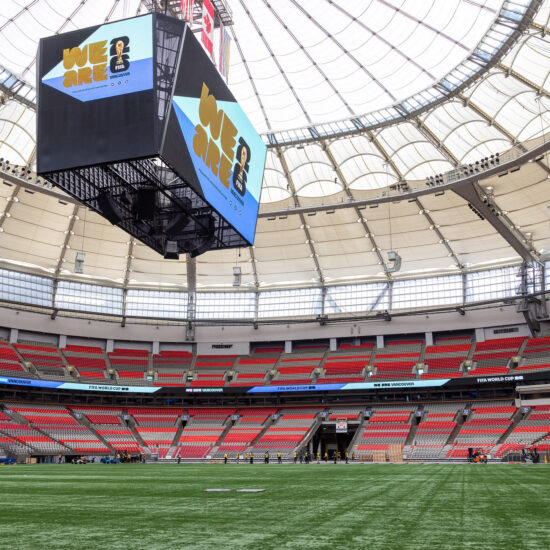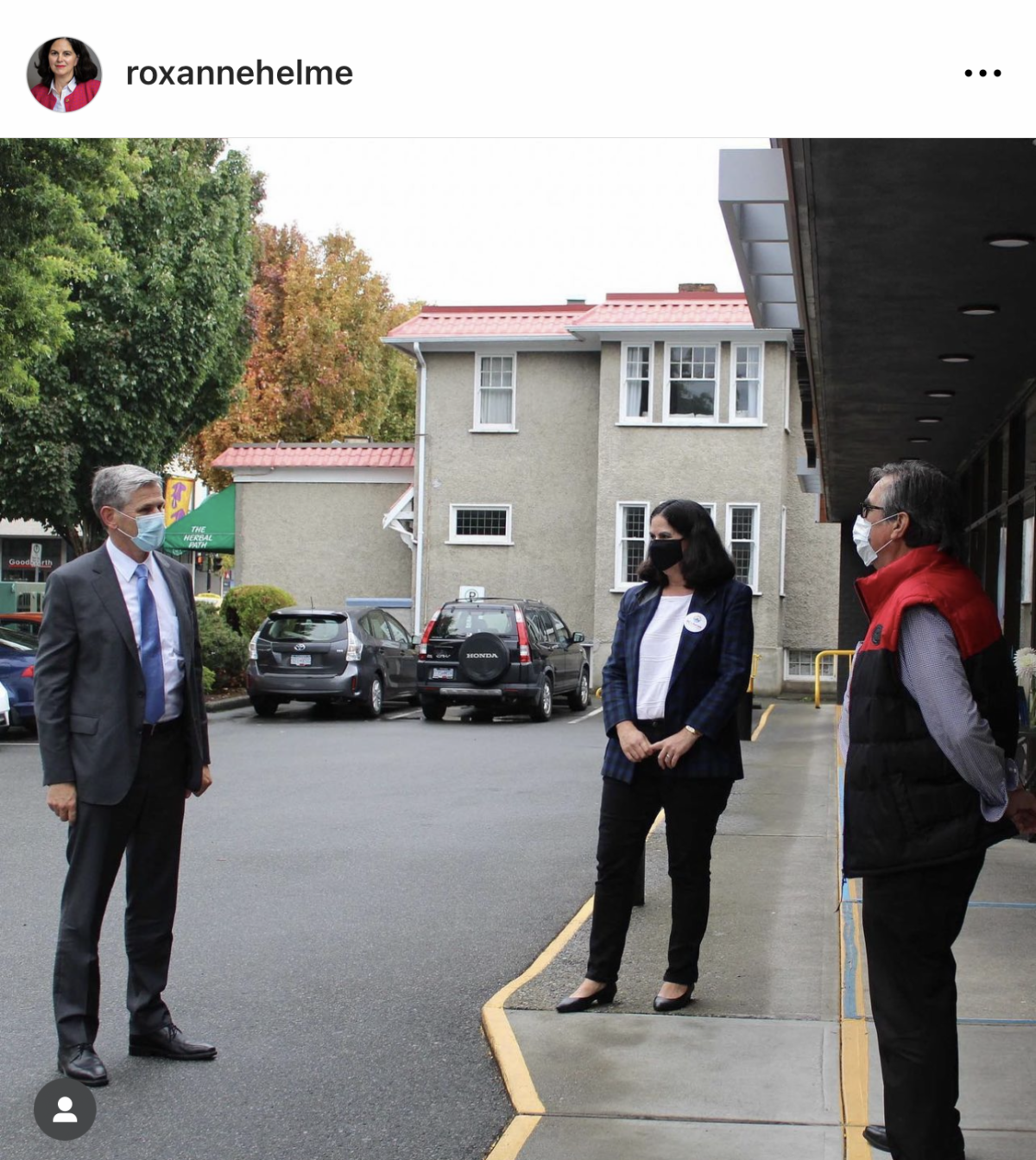
Bob Mackin
The Oak Bay-Gordon Head riding was up for grabs after Andrew Weaver decided to return to his University of Victoria laboratory, instead of running in the scheduled October 2021 provincial election.
The BC Liberals chose Victoria lawyer Roxanne Helme in June 2020, hoping to regain the seat that Ida Chong held from 1996 to 2013.
Then Helme picked up her home phone to a robocall.
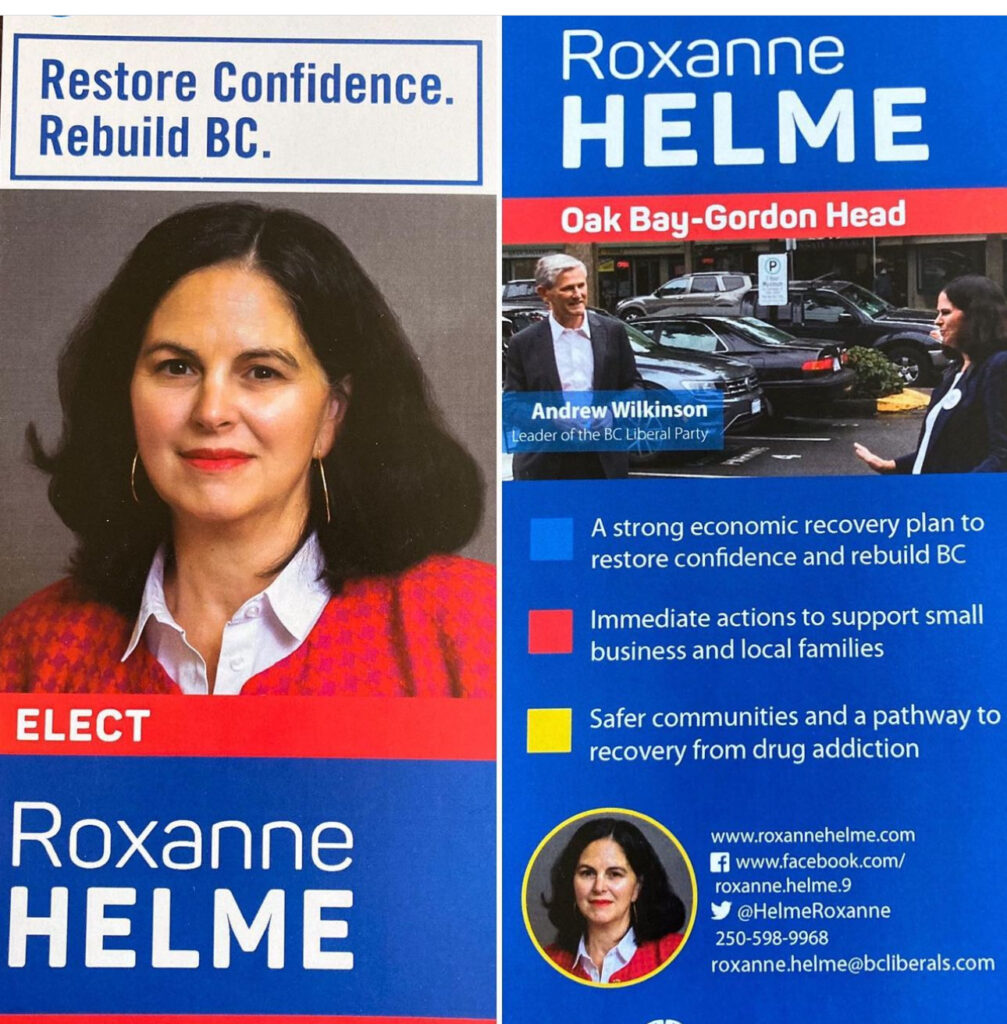
Roxanne Helme’s 2020 campaign promotional items (Helme/IG)
“As a result of the questions asked on the telephone poll, I became concerned that I was being polled by a department of the provincial government for what I considered to be political purposes,” Helme swore in an affidavit last August. “As I was to be a candidate in the next election, whether the then current provincial government may be contemplating calling a snap election in spite of the global pandemic was something that was very much top of mind for me.”
Helme’s fears were realized on Sept. 21, 2020. Premier John Horgan took advantage of polling results favourable to the NDP and sought a majority mandate during a perceived lull in the pandemic.
Helme eventually finished third on Oct. 24, 2020, more than 8,100 votes behind the NDP’s Murray Rankin. But this reporter’s quest to learn how a taxpayer-funded poll informed Horgan’s power play prompted Helme to file a freedom of information request in January 2021 for government polling records from the first nine months of 2020.
Between November 2021 and July 2023, she received five reports, totalling nearly 2,900 heavily censored pages. The government resisted full disclosure, so the Office of the Information and Privacy Commissioner intervened. An adjudicator decided Feb. 20 that Helme has a right to see even more.
Jay Fedorak ruled that unused, draft poll questions and advice about the wording of questions could stay secret. But he ordered disclosure by April 4 of 25 pages that the government did not want to give up.
“The [polling] service providers provided the ministry only with the results in factual terms. They did not provide any expert analysis that would provide any additional meaning to the results,” Fedorak wrote. “Moreover, it appears significant to me that the type of information that the ministry has withheld in this one report also appears in other reports at issue and the ministry has disclosed it. The ministry has not explained why it did not treat this type of information consistently.”
From mid-April to June 2020, the NDP government used $95,000 of taxpayers’ money to hire the party’s favourite pollster, Strategic Communications Inc., for “COVID-19 Daily Tracking Polling.” Stratcom learned just under three-quarters of respondents felt the NDP government was on the right track. They were generally happy with management of the pandemic and other issues, such as cost-of-living, economy and jobs, and climate change/global warming.
The project ended just in time for the NDP to start digital campaign training. In July, Stratcom collaborated on a series of telephone town halls to boost the profile of candidates who upset BC Liberals in 2017.
On the third Monday of September in 2020, Horgan scrapped the confidence and supply agreement with the Greens, disregarded the fixed election date law the NDP amended and hit the campaign trail. Just over a month later, he achieved a 57-seat majority.
“For a government to instead use taxpayer money for its own political advantage is a serious breach of the public’s trust and indeed a violation of law,” Helme said. “In early 2021, I simply asked for details of taxpayer-funded public polling leading up to a snap election call and I found my request not only stonewalled for over three years, but significant public legal resources being invested to fight my request.”
NDP also gauged public opinion on the cusp of the pandemic
Among the reports Helme received were two from February 2020, prior to the public health emergency, by Viewpoints Research and Research Co. (The latter company’s president is BIV contributor Mario Canseco.)
In a July 2023 affidavit, Government Communications and Public Engagement (GCPE) assistant deputy minister Jen Holmwood explained polling is used to understand the public in order to craft the government’s messaging.
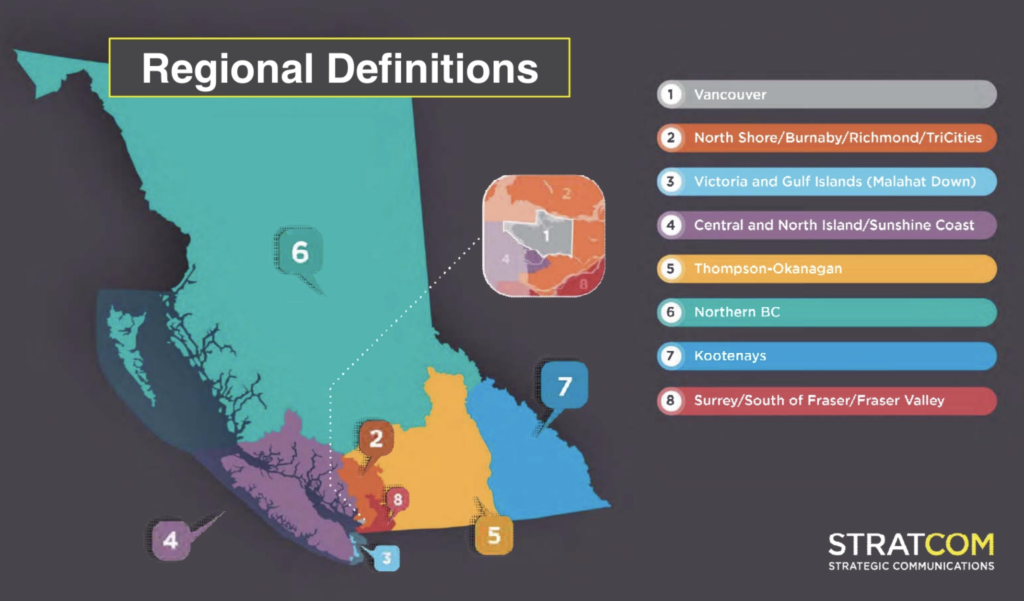
The regional breakdown for Stratcom’s COVID-19 daily tracking project (BC Gov)
“Effective communication from government is dependent on assessing the audience and meeting them where they are and progressing from there. In this case the people of British Columbia were the audience,” Holmwood’s affidavit said.
The government originally balked at releasing information to Helme about the public’s opinion of Indigenous issues. Political appointee Holmwood said the government did not want the public to assume approaches to issues, such as reconciliation, were decided by polling.
“I believe that the disclosure of this information could reasonably be expected to harm the conduct by the B.C. government of relations between it and Indigenous governing entities,” Holmwood said.
In early February, before Fedorak’s order, the government relented due to the passage of time and gave Helme more information.
Research Co.’s February 2020 survey came during the Shut Down Canada anti-pipeline protests in support of the Wet’suwet’en hereditary chiefs. Respondents were more likely to call on the provincial government to take a tough stance against road and train blockaders (66 percent) than do more to stop the Coastal GasLink pipeline from being built (41 percent).
Respondents supported the United Nations’ Declaration on the Rights of Indigenous Peoples. But, when it came to the pipeline, “majorities of British Columbians think the pipeline should be built (65 percent), believe the project should continue because it has the support of the majority of Indigenous communities along the route (56 percent), and oppose the methods of the hereditary chiefs and the people trying to stop construction (52 percent).”
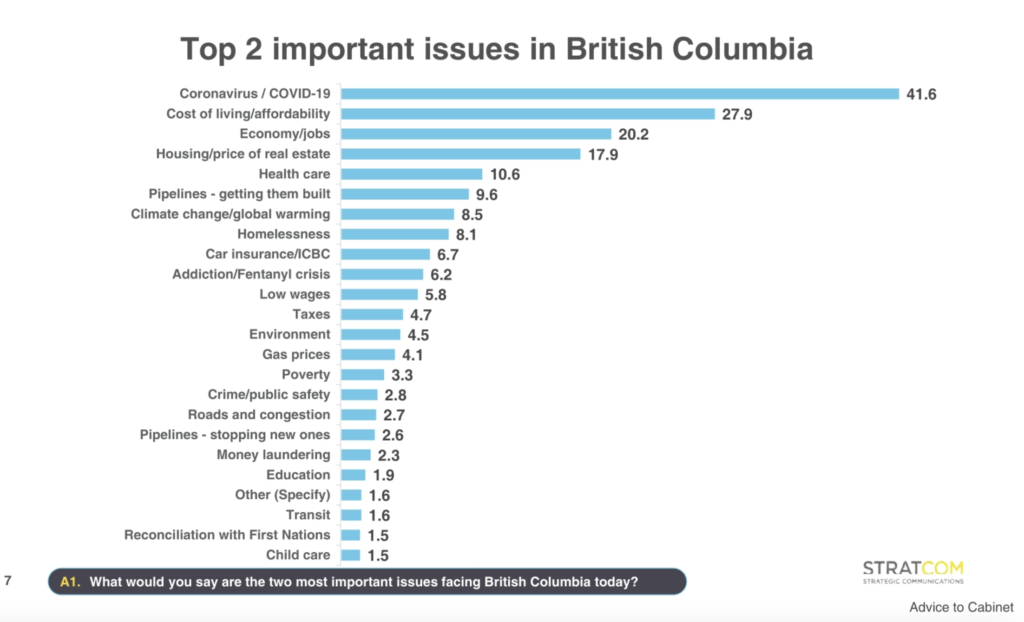
Stratcom asked respondents about key issues (BC Gov)
A majority of respondents (55 percent) expressed satisfaction with the government’s performance, unchanged since August 2019, but economic confidence had slipped four points to 40 percent. Affordability, health care and economic growth were the most important issues, while “lower consideration” was given to child care and reconciliation with First Nations, the report said.
Also from February 2020, Viewpoints Research delivered findings from six focus groups in Penticton, Campbell River and Vancouver on government priorities, infrastructure and advertising.
“In the six groups, awareness was high and people generated a wide-ranging list of actions, most frequently mentioning the end of MSP premiums, health care improvements, more, and more affordable, childcare spaces, green initiatives and the government’ s position on the Trans Mountain Pipeline,” said the Viewpoints report.
“The government actions important to the greatest number of participants are: more affordable housing (score of 47), increasing the minimum wage (41), introducing the vacancy tax (22), opening more urgent and primary care centres in B.C. (21) and capping rent increases (19).”
The Penticton focus group deemed affordable housing less important, but the vacancy tax and urgent and primary care centres were more important in Vancouver than elsewhere. Public transportation investments ranked higher in Penticton and Vancouver, while Campbell River’s emphasized reduced childcare fees/more spaces and the hiring of more doctors and nurses.
Government is constantly polling. Last year, according to a list obtained under FOI, GCPE commissioned 16 polls. There were two omnibus surveys by Leger, two on Surrey issues by Research Co., and one each by Viewpoints and Research Co. about housing.
Helme is curious about taxpayer-funded polls en route to the scheduled Oct. 19 election. She also wonders why British Columbians must pay the $10 freedom of information application fee and wait more than a month, at least, for heavily censored polling reports.
The federal government proactively publishes summaries on its public opinion research website, dating back to 2006.
Support theBreaker.news for as low as $2 a month on Patreon. Find out how. Click here











